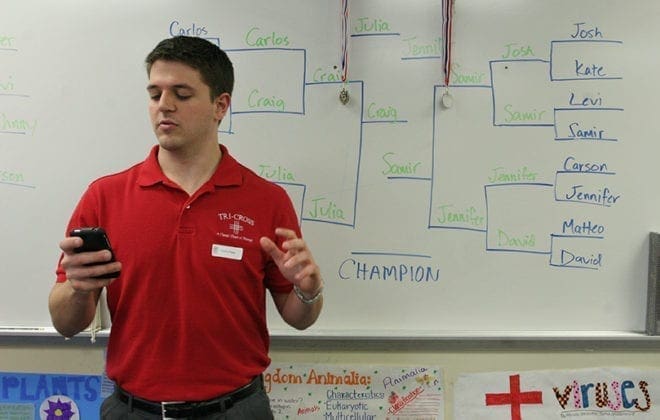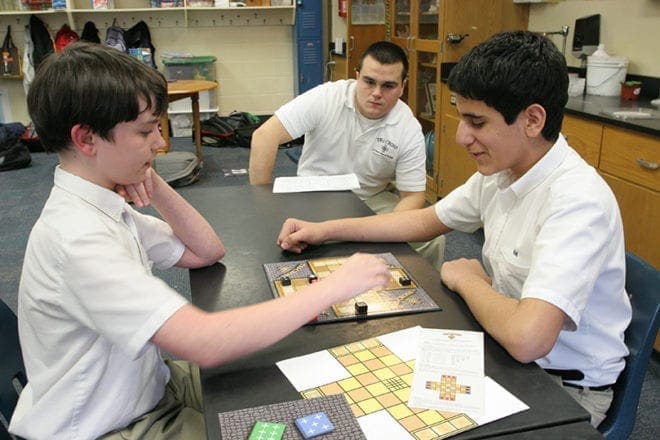 Photo By Michael Alexander
Photo By Michael AlexanderAtlanta
Tech Grad Successfully Revives Father’s Board Game
By STEPHEN O'KANE, Staff Writer | Published March 18, 2010
Jeff Burns remembers playing Tri-Cross with his family when he was a student at Immaculate Heart of Mary School. Over a decade later, Burns returned to his old classroom to teach students a new, revamped version of the strategy game, originally created by his father, Glenn, in the 1980s.
Sixteen IHM middle school students participated in an afterschool Tri-Cross tournament recently, where each game had a 10-minute time limit and winners moved on in a bracket format. The students, many of whom had been playing for just a few days, showed up enthusiastic and ready for strategic competition. It was obvious these youngsters had taken an immediate liking to the game.
Burns’ visit to the Atlanta school was one of nearly 100 to educational facilities in the last year or so. Since its recent re-entry into the market, Tri-Cross has won a Dr. Toy Award as of its “100 Best Products of 2009” and the Creative Child magazine 2008 Game of the Year Award.

Standing in front of the tournament bracket, Jeff Burns watches the clock on his phone wind down so he can signal the Tri-Cross tournament participants to start playing. Burns is the vice president of Games For Competitors, the company that markets Tri-Cross. His dad Glenn, the game’s originator, is the president of the company. Photo By Michael Alexander
To win the game, which can accommodate two, three or four players, participants must claim the center square on a cross-shaped board for four turns or capture all other players’ pieces. Each piece is given a ranking by number, allowing it to jump pieces that have a lower ranking. There is also a Tri-Cross piece that can jump the highest-ranking object but is vulnerable to being jumped by all other pieces.
Burns, also a graduate of St. Pius X High School, was taking a product development course at Georgia Tech when he decided to dust off the game and see what he could do with it.
“After talking with my parents, I felt inspired to bring the idea back,” Burns said. “It was a great part-time project for me and my dad.”
He has fond memories of playing the game with his family when he was younger. There were only a few hundred games made back when it was initially created and marketed in 1986 and despite the immediate popularity among players, the time and funding weren’t there to market or continue producing the product.
Burns’ father created Tri-Cross as a quicker alternative to chess, where games can take a long time to finish. Tri-Cross is often described by students as a mix between chess and checkers. It requires a simple setup and games are typically short, about 10 to 15 minutes. However, there are several different ways to win the games and so the strategy aspect is heightened.
Tri-Cross was reintroduced at the 2008 New York Toy Fair and received the National Parenting Center Seal of Approval for 2009.
The game is appealing to educators because it encourages students to become problem solvers and features variations of game play that can increase the challenge for different ability levels. Tri-Cross also develops logical and abstract thinking skills, as well as visualization and memory. The company Web site includes video tutorials and testimonials from teachers and students. Tri-Cross is available at Learning Express and School Box locations in Georgia as well as game stores.

Nick Rossi, director of operations at Games For Competitors, looks on as Craig Schwartz, left, and Samir Alyateem face off in the championship game for the winners bracket. Schwartz, a seventh-grader, was the victor. Sixth-grader Ethan Bills was the champion in the loser’s bracket. Photo By Michael Alexander
“It is a fun game. There’s a lot of strategy,” said Craig Schwartz, a seventh-grader at IHM, who won the tournament and a free game to take home. “It’s a great game for the whole family.”
Since Schwartz and his family had already bought the original version, he chose the eco-friendly version, which is travel size and features a playing space made of organic cotton, as his prize.
Samir Alyateem, an eighth-grader at IHM, has really taken a liking to Tri-Cross after just a few days of game play.
“It is an easy game to learn. Chess can be really boring, and it’s not like chess,” he said.
Burns came to the IHM tournament to answer questions and explain the rules to those who had not played or who needed their memories refreshed. He also moderated the timer and happily awarded the prizes to the tournament’s winners.
He announced to the students that he hopes to host a much larger tournament with bigger prizes in a few months and encouraged the kids to continue playing to sharpen their strategies.
“We really wanted something for the whole family,” said Burns.
For more information, visit www.gamesforcompetitors.com.